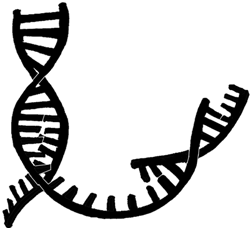![[Metroactive Features]](/features/gifs/feat468.gif)
[ Features Index | Silicon Valley | Metroactive Home | Archives ]
Genome Hackers
By Annalee Newitz
I SPENT THE BETTER part of last week hanging around with a group of people who are about to change the way we understand evolution, genetic inheritance and cellular functions. The weird thing is, they don't seem to understand the magnitude of what they're doing.
These people are called bioinformaticists, and they're a mixed bag of biologists, software developers, physicists, mathematicians and entrepreneurs who are all working in the nexus between high tech and molecular biology. And I met vast quantities of them at the O'Reilly Bioinformatics Technology Conference in Tucson, organized by my favorite tech-book publisher, O'Reilly (www.oreilly.com).
So, what the hell is bioinformatics? A lot of the people at this conference were asking themselves the same question. For the most part, people agreed that bioinformatics describes an emerging field whose practitioners use computers to compile, analyze and distribute the huge amounts of data coming out of labs devoted to creating maps of genomes. The tools of the trade are giant relational databases, software programs that can compare long strings of the letters representing nucleic acids and visualization programs that represent genomic data using everything from bumps to colors.
Viewed from a rather sensational angle, bioinformaticians are genome hackers, the people who figure out the many ways genes translate their sequences into proteins and how those proteins create an entire living being out of microscopic cells. They're the ones who are discovering how closely related humans are, on a genomic level, to mice and yeast. And bioinformaticians are even working on cures for cancer.
But to the average bioinformatician, things are far from glamorous. She or he may be hacking the code of life, as it were, but when you start digging that deep into the body, what you're dealing with are strings of letters. You're in algorithm land, a world of abstract data. Confronted with color-coded graphs and strings of AGTC all day, it's hard to remember that what you're doing is hacking life itself.
One of the conference keynotes was delivered by Ewan Birney, a charismatic Brit whose renowned work at the European Bioinformatics Institute (EBI) and contributions to the open-source project Bioperl have made him a veritable poster boy for the emerging bioinformatics community. Eyes shining, Birney told a packed audience that "it's all about the data, just getting into the data and playing around with it." Bioinformaticists are data geeks, plain and simple. They're not trying to invent plants with feet or humans with fins. They just want to figure out the best way to comprehend the enormous amount of raw information contained in genomes.
And yet it's undeniable that these data geeks are producing the knowledge infrastructure that will allow other people to start engineering brand-new genomes. You could say that bioinformatics brought you genetically engineered crops in the same way a peacenik named Einstein brought you the atomic bomb. Einstein never thought his pure research would be put to such heinous uses, but it was. And so will all that data being produced by bioinformaticians, who are in general a rather progressive and thoughtful bunch--hardly the types to engineer the perfect superbeing, if you know what I mean.
Perhaps what struck me most about hanging around with the bioinformaticists was their ability to talk about the "How" of genome hacking while rarely asking "Why?" So you've discovered the perfect algorithm for looking at all the proteins produced by a given gene. Or you've used a fantastic Perl program written by the supergenius Lincoln Stein to discover that earthworms and humans both have a gene that, when mutated, causes both species to grow spots. Who will use this information and why? Nobody at this conference was asking this question.
I don't mean to say that these data geeks were naive--hardly. There were many spirited debates about whether universities should be allowed to sell their discoveries to industry. Lots of bioinformaticians are rightfully suspicious when somebody wants to commercialize their work, whether that person represents a company or a magazine like Science.
Despite their thoughtfulness about such issues, however, I rarely heard anyone worry about what would happen if their data were used for ill-advised or downright destructive purposes that might impact the lives of many species. Of course, it's difficult to know how to present your data in a way that ensures it will be used for social good. But that doesn't mean the dilemma isn't worth pondering. What would Einstein have done if he had foreseen the possibility of atomic bombs? Maybe he would have become a gardener instead of a physicist.
[ Silicon Valley | Metroactive Home | Archives ]
Copyright © Metro Publishing Inc. Metroactive is affiliated with the Boulevards Network.
For more information about the San Jose/Silicon Valley area, visit sanjose.com.
![]()

Annalee Newitz ([email protected]) is a surly media nerd who now understands that it's all Pete's fault.
From the February 7-13, 2002 issue of Metro, Silicon Valley's Weekly Newspaper.